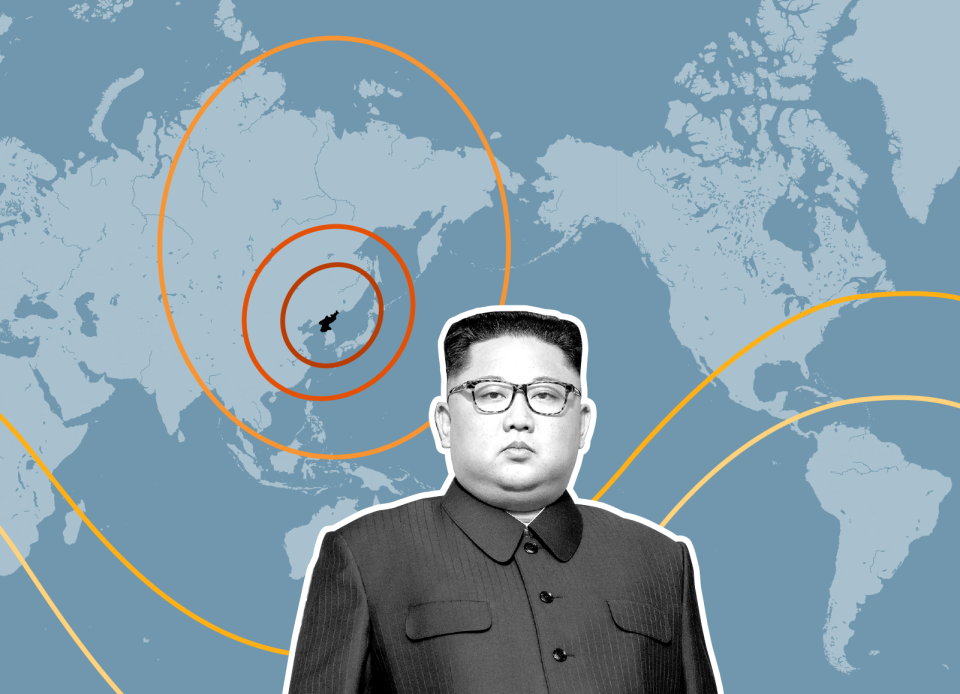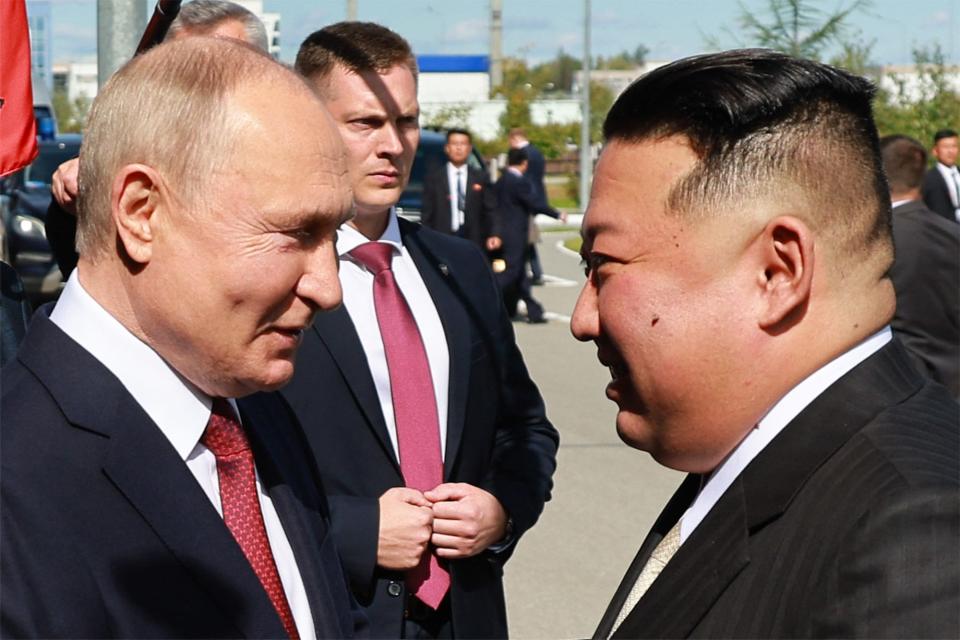North Korea could get satellite and nuclear weapons help from Putin. Why it matters.
- Oops!Something went wrong.Please try again later.
- Oops!Something went wrong.Please try again later.
- Oops!Something went wrong.Please try again later.
WASHINGTON − The unusual summit this week between Vladmir Putin and North Korea's Kim Jong Un raised questions about what Russia might gain from a deal: weapons and ammunition to help in its war with Ukraine. But what North Korea receives in return could pose an even bigger threat to U.S. interests in the long run, analysts tell USA TODAY.
They say Kim − dubbed Little Rocket Man by then-President Donald Trump – will likely get Russia’s advanced satellite technology as part of the deal, enabling him to take his distinctly anti-Western global ambitions into space, the fast-evolving new domain of warfare.
But North Korea’s access to Russian space and satellite technology is of particular concern to Washington when combined with Pyongyang’s extensive ballistic missile arsenal, according to Anthony Ruggiero, counter-proliferation director on the White House National Security Council during the Trump administration.
Most immediately, it would likely give one of the most geopolitically sanctioned and isolated world leaders the ability to successfully launch and operate spy satellites after decades of trying. Kim would then likely use them, at the very least, for military and intelligence-gathering purposes on the Korean peninsula, against U.S. allies like South Korea and Japan – and elsewhere around the world, Ruggiero and other North Korea watchers said.
More: Is Putin getting desperate in Ukraine? Outreach to Kim Jong Un puts spotlight on weapons shortages
During Kim's tour of Russia's most modern space launch center Wednesday, Putin promised to help Pyongyang build satellites, Reuters reported. It also said the promised Russian aid comes as North Korea's scientists have vowed to try another launch of its new Chollima-1 booster in October in an effort to put its first spy satellite into orbit.
Satellite technology that can also be used for nuclear weapons
David Albright, a physicist, nuclear weapons expert and founder of the non-profit Institute for Science and International Security in Washington, said that Russia in its public statements is likely trying to be coy by saying it would provide assistance to North Korea with general satellite technology only.
But Albright told USA TODAY that Pyongyang could easily use the satellites for military applications too, and use the technology in its nuclear weapons program.
For instance, North Korea has an arsenal of nuclear warhead-topped intercontinental ballistic missiles, that could easily reach the United States. But they wouldn't work, in part because the frigid temperatures and intense radiation in space would fry their circuitry, Albright said. The U.S., Russia and other advanced countries know how to protect their missiles from using the same technology they use to protect their satellites, enabling them to survive and hit their intended targets many thousands of miles away.
If Russia were to share that kind of satellite technology to North Korea, it could also use it to make its missiles a potential threat to the U.S. homeland, Albright said.
"That's the assessment of my institute and while I don't think it's shared as much in the public domain, it's certainly shared among governments that we've talked to as well," Albright said. "This would allow them to get closer to targeting a city in the United States. So this is an important step and we've certainly been waiting and watching nervously North Korea's attempts to launch satellites."
Over the past few months alone, Albright Ruggiero and other experts said, North Korea has tried and failed at at least two satellite launches. "So any help from Russia, I would view negatively," Albright said.

Bigger U.S. concerns than just North Korean military satellites
Kim has said such satellites are crucial to enhancing the threat of his nuclear-capable missiles, according to an Associated Press report. It noted that North Korea has repeatedly failed to put its first military spy satellite into orbit.
But the sharing of such strategic weapons technology could also significantly enhance North Korea’s ability to advance its broader ballistic missile and nuclear weapons programs with help from Russia, Ruggiero said.
“This will open the proliferation pathway to further advance their programs,” Ruggiero said. “North Korea's nuclear weapons program is pretty far advanced. But obviously, Russia has done a lot more in that sphere that will be of use to North Korea.”
More: North Korea's Kim Jong Un backs Russia in war against Ukraine at Putin meeting
These types of technology exchanges are prohibited under United Nations-sponsored laws and sanctions, forcing North Korea to obtain technology for its nuclear and ballistic missile programs through a global network of front companies and third-party cutouts.

Specifically, the UN Security Council passed a resolution in November 2016, 2016 requiring all member states -- including Russia -- to suspend scientific and technical cooperation with North Korea except for medical exchanges. Some areas of scientific or technical cooperation are also allowed, as long as the UN determines "the Committee has determined "on a case-by-case basis that a particular activity will not contribute to the DPRK’s proliferation sensitive nuclear activities or ballistic missile-related programs."
“This (potential agreement) is like, we’re throwing that away, we're just going to cooperate on these things that are prohibited and we’re not going to even pretend we’re not," Ruggiero said.
Victor Cha, a North Korea expert on the George W. Bush administration’s National Security Council, said Putin wanted to “deliver a message both substantively and symbolically” by meeting Kim at the cosmodrome in the Russian Far East and giving him a tour of the facility’s launch vehicle assembly building and spaceport.
By doing so, Putin is telling the world he is willing to help North Korea with satellite technology, and possibly technology for space-launched vehicles and ICBMs, Cha and his associate at the Center for Strategic and International Studies, Ellen Kim, wrote in a commentary piece published Wednesday.
These satellites would not only complicate U.S. efforts to shore up deterrence on the Korean peninsula with South Korea, but these would also help Kim obtain “key weapons technologies to complete his drive for a survivable nuclear and ICBM capability to threaten the U.S. homeland.”
This article originally appeared on USA TODAY: Is Russia helping North Korea satellite, nuclear weapons efforts?

